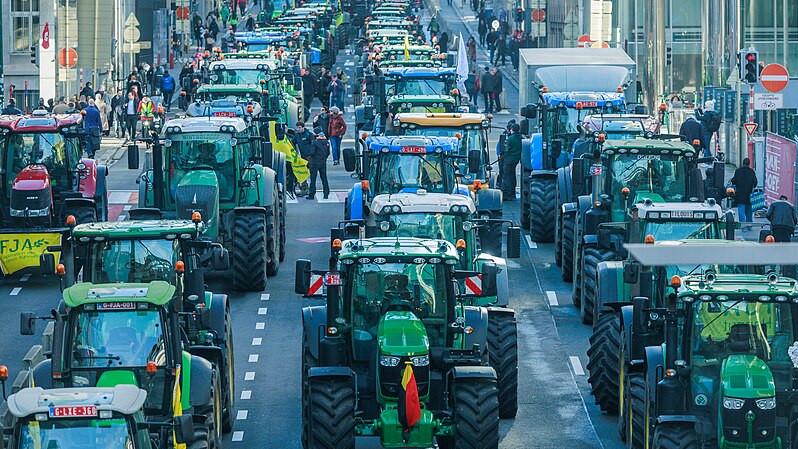Farmers across Europe, especially in France, have been protesting against new EU agricultural rules. Many of the rules they have are opposing are measures to protect the environment and reduce greenhouse gas emissions.
Of course, right wing politicians have jumped on the bandwagon, repeating the familiar stories that progressive climate policies are attacks on ordinary people. Some farmers have shown support for these politicians.
The EU backs down
The EU and individual EU governments have backed down, scrapping many of the proposed measures. The issue has been a setback for the fight against climate change, and has boosted support for right wing politicians.
Some EU politicians and officials have been strongly critical of the failure to implement the climate measures. Irish Environment Minister Eamon Ryan said “Not deliver[ing] on the protection of biodiversity is a shocking statement to the rest of the world.” https://www.pbs.org/newshour/politics/a-major-european-climate-change-plan-stumbles-amid-farmer-protests But because of the political dimensions of the protests, politicians have been careful not to condemn the farmers directly.
Opposition from farmers to climate policies aimed at reducing greenhouse emissions is a significant development. It raises a huge question mark over how agriculture is to be reformed.
Rural populations across the world have usually been more conservative than city dwellers. But this has not always been the case. Radical peasant revolts have taken place in many countries around the world, and peasants have supported guerrilla struggles in Africa, Asia and South America.
Socialist theory on agriculture
Socialist have written extensively on peasants and rural agriculture. The orientation of socialist parties towards peasants and farmers was particularly important in the 17th and 18th centuries. At the time rural populations were in the majority in the most advanced capitalist countries, and were a considerable political force.
Marx himself always supported small peasants who opposed large feudal owners, seeing their struggle as an important element of the fight against feudalism. But he opposed the struggle of small property owners against large capitalist concerns, which he saw as counter-revolutionary. He believed that the replacement of small farms by large agricultural businesses would follow the same path as the concentration of industries. For him, large capitalists enterprises would lay the foundations for a socialist state, in which the means of production, including agricultural land, would be collectively owned.
In the Russian Revolution and its aftermath, Russia, which was still very much a backward agricultural country, was in a state of chronic crisis. The land owners and peasantry loomed large on the political landscape.
Lenin accepted that emancipation for peasants meant the elimination of privately owned agriculture. He advocated support for small land owners, but his perspective was for the eventual collectivization of all agriculture.
Russia under the early Soviet government was largely agricultural. To expand the economy and increase production, Stalin wanted the Soviet Union to develop a more efficient agricultural sector. The policy of collectivization was introduced, in which larger farms replaced smallholdings held by peasants.
Stalin and the Kulaks
The main targets of this policy were the Kulaks, the wealthiest farmers. But collectivization would deprive them of the life they were accustomed to. Many responded by burning crops, killing livestock and damaging machinery. The result was a famine.
In 1931 the Soviet government started using force to eliminate private agriculture. There were brutal penalties for opposition to collectivization. By 1934 some 7 million Kulaks had been killed.
But the undemocratic and centralized decision-making in the Soviet economy stifled efficiency. The degeneration of all sectors of the economy was the main cause of the overthrow of the Soviet government in the 1990s.
Farm sizes in Europe
The trajectory of rural land ownership in the rest of Europe has been varied, but with some common themes. In line with Marx’s predictions, the development of European economies has indeed led to wide scale replacement of small farms by large agricultural corporations. More than 50% of the EU’s farmland consists of farms larger than 100 ha, most of it owned by large commercial entities. (https://ec.europa.eu/eurostat/statistics-explained/index.php?title=Farms_and_farmland_in_the_European_Union_-_statistics)
But small farmers have also proved to be very resilient. Although the trend towards larger farm sizes continues, more than 60% of EU farms are still owned by families or very small farmers.
(Small and family farms have also persisted in the US, alongside large agricultural corporations.)
Farmers’ grievances
The European farmers’ grievances are generally well known. Many of them relate directly to EU measures to reduce nitrogen emissions and to protect the environment. These regulations include:
- Reducing cattle numbers and land areas under cultivation
- Leaving land fallow to allow it to recover
- Allocating a portion of land for environmental protection
- Increasing water tariffs
- Big reductions in the use of pesticides and herbicides
- Reducing diesel subsidies (also an EU money saving measure)
Farmers complain that they are being unfairly forced to compete against imported products that are not subject to the same environmental regulations. There is strong opposition to the proposed EU-Mercosur agreement, aimed at increasing free trade between the EU and South American countries. Brazil and Argentina are huge agricultural producers, with much looser environmental regulations for farming than in the EU.
Climate change itself is making its impact felt, with droughts and floods affecting many farmers.
More general grievances are about bureaucratic red tape imposed by remote and out of touch EU officials.
Financial pressures
The root of all these grievances is financial. Small farmers, in particular, are finding it difficult to break even. Their desperation and determination have fueled the protests that have forced the EU politicians and top officials to retreat from their latest agricultural plans.
Environmental activists, despite the backdrop of failed climate policies, have come out in support of the farmers. 50 civil society organizations released a joint statement with several accusations against EU policy makers and agribusiness:
The root of all these grievances is financial. Small farmers, in particular, are finding it difficult to break even. Their desperation and determination have fueled the protests that have forced the EU politicians and top officials to retreat from their latest agricultural plans.
Environmental activists, despite the backdrop of failed climate policies, have come out in support of the farmers. 50 civil society organizations released a joint statement with several accusations against EU policy makers and agribusiness:
- the EU is implementing an “unsustainable, market-driven, and trade-oriented agricultural model”
- most of its funding is going to the larger farming enterprises
- agribusiness corporations are more interested in profit than sustainable, resilient practices, making farming unprofitable for small producers.
- the EU should be working hand in hand with farmers.
Agriculture crises
The squeezing of small farmers by the economics of large scale production is largely what Marx predicted. As with capitalist industry, economies of scale allow costs to be reduced.
What Marx didn’t predict was the resilience of small farmers and the survival of millions of small and family farms one and a half centuries later, in economies dominated by capitalist production.
And what he could not have foreseen was the scale of ecological destruction wrought by market forces – the elimination of natural habitats, the terrible loss of biodiversity, the harmful effects of pesticides and herbicides, the degradation of soil, and of course, the acceleration of greenhouse gas emissions.
Market driven agriculture
The joint statement by the 50 civil society organizations highlighted the damaged caused by market driven agricultural systems. This is something that every ecosocialist will agree with.
But the plight of small farmers is not such a straightforward issue for socialists. Socialists would have little reason to support small farmers if the only issue was their lack of profitability compared to the economies of scale of large farms.
But the need to protect and restore agricultural land mean that economies of scale are by no means guaranteed. Sustainable farming and protecting environmental areas will require the breaking up of the huge fields that have allowed a high degree of mechanization. And the fact that small farms have survived for so long indicates that size alone is not a prerequisite for financial sustainability.
Progressive agricultural policies
What would an environment-friendly agricultural policy look like?
Firstly, as the farmers and civil society organizations have demanded, it should be developed in a real partnership with farmers themselves. Large, small and family farmers would have to be represented separately.
Secondly, there should be incentives for progressive agricultural practices, and an end to perverse incentives that promote environmental degradation. A progressive prohibition on directly harmful practices is needed.
Thirdly, farmers must be protected from (i) unfair competition from imports of products from agricultural areas not subject to the same environment regulations, and (ii) large retailers that use their market dominance to keep prices low.
Fourthly, there must be sufficient funding for incentives and progressive subsidies to ensure that farms can be profitable.
Policies, planning and regulation
Unlike in the 19th and early 20th centuries, small farmers today don’t pose significant obstacles to a socialist transformation. The challenge of gaining of control over the huge transnational corporations and financial institutions will far outweigh the effects of a properly regulated market for agricultural products. Planning and regulation, with the participation of farmers, will be needed to ensure that the right food is grown in the right quantities, at the same time that the environment is protected and restored.
Small farmers will be crucial actors in the fight against climate change. Their struggle to participate in the creation and implementation of environment-friendly policies will be crucial in reducing greenhouse gas emissions to an acceptable level.


